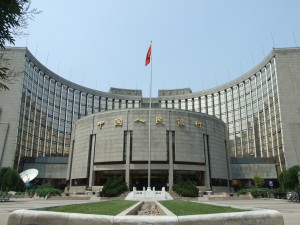Policy boost expected to become evident during third quarter
The People’s Bank of China has lowered its full-year GDP growth forecast to 7 percent fromthe previous estimate of 7.1 percent issued in December as first-half economic momentumturned out to be weaker than expected.

“But we have reason to expect some modest recovery in sequential growth in the secondhalf,” said the updated mid-year report by the central bank.
The PBOC also slashed its forecast for consumer price inflation to 1.4 percent from 2.2percent previously. And it cut a number of other key forecasts:
・Exports: To 2.5 percent growth from 6.9 percent previously.
・Imports: To a 4.2 percent contraction from growth of 5.1 percent.
・Fixed-asset investment: To a rise of 12.6 percent from 12.8 percent previously.
・Retail sales: To growth of 10.7 percent from 12.2 percent.
Overall economic conditions are worsening because of a faster-than-expected slowdown ofexports and real estate investment, with the lowest indicators since the global financial crisisin 2008, Ma Jun, the central bank’s chief economist, wrote in the report.
“Recently, the nonperforming loan ratio has been rising and commercial banks have becomemore cautious about lending, especially to producers of coal, steel, construction materials andcompanies involved in export-oriented manufacturing and real estate,” Ma said.
The PBOC did, however, forecast that the positive effects of already-announced policies willbecome evident starting in the third quarter.
Recoveries in the United States and European economies are likely to support China’s exportrebound. In addition, the rise of housing prices since April will accelerate property investment,according to the report.
Major economic figures for May are scheduled to be released by the National Bureau ofStatistics on Thursday, and analysts’ consensus is for some slight improvement.
Credit ratings agency Moody’s Investors Service Inc released a report on Wednesday, sayingthat the number of companies in China in financial distress will rise as slower domesticeconomic growth and the government’s reform agenda, intended to allow markets to play a”decisive” role, expose overstretched balance sheets in the corporate sector.
“But policy easing and government support will prevent rising corporate distress fromescalating to a level that would cause systemic risk to the onshore and offshore markets,” itsaid.
It added: “Room is also available for a further loosening of monetary policy shouldmacroeconomic conditions continue to deteriorate, given that real lending rates and thereserve requirement ratio remain high.”
Compared with other emerging markets, China has a more stable economic foundation, sothe expected move by the US Federal Reserve to raise interest rates will have merely alimited impact on the country’s financial system, the PBOC report said.
However, capital outflows and currency depreciation in other emerging economies may cutChina’s exports, it said.